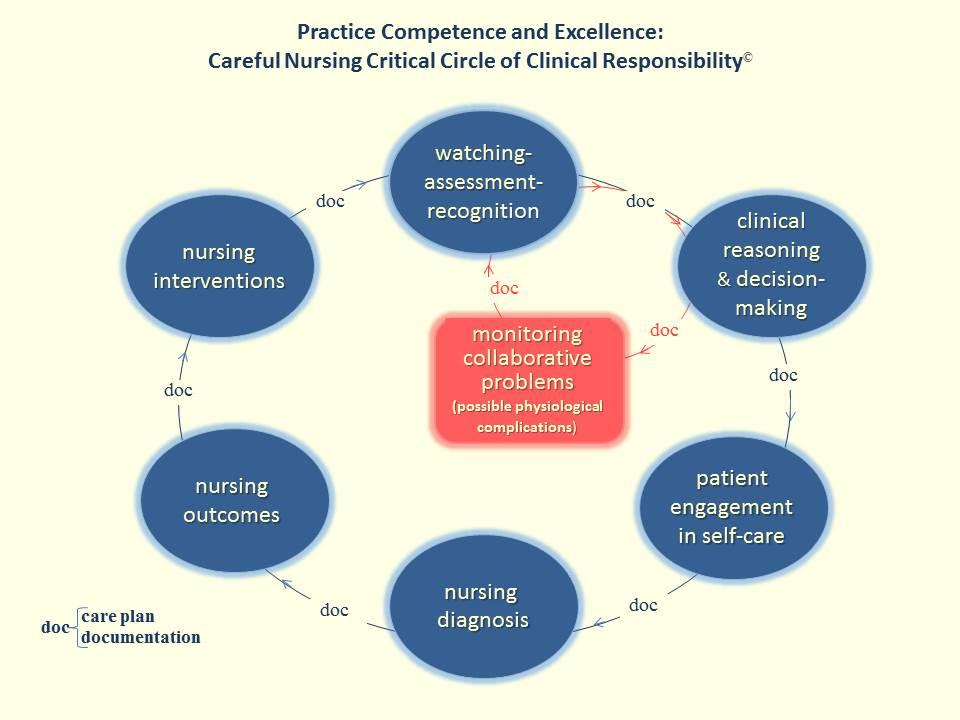Concept of Excellence as it Relates to Nursing Education
The concept of excellence in nursing education refers to the practice of ensuring that nurses who graduate with diplomas, associate degrees, baccalaureate, master’s degree or doctoral degrees not only have the theoretical knowledge but also practical experience to handle patients (Wittmann-Price, 2008). The concept has gained popularity in the recent past due to the growing partnership between learning institutions and healthcare facilities in various parts of the world. It seeks to ensure that the graduates are competent enough to handle patients in various contexts. The following figure shows fundamental elements of excellence in nursing education.

As shown in the above figure, a nurse can only be considered competent enough to handle patients if he/she has the capacity to the tasks identified in the figure above. They must be able to watch over the patients, assess them, and recognize any complications that may need the attention of a doctor. The graduate must have proper clinical reasoning and decision-making skills. According to Nee (2013), such nurses should have skills in patient engagement before they can start working in healthcare facilities. The concept emphasizes on nursing diagnosis. As Montagu (2010) says, nurses should be able to identify any new complications in their patients as soon as possible. There are also other cases where nursing intervention may be necessary. This is specifically so when the patient develops complications at a time when the doctor is out of reach. All these factors will culminate into nursing outcomes.
How Changes in Nursing Education Relate to Changes in Other Health Professions Education
According to Montagu (2010), nursing education has undergone a number of changes in the recent past. Nurses are no longer mere assistants to the doctors in a healthcare setting. They have become an integral part of the medical staff that can go beyond offering care services. This means that they can do some tasks that were previously considered exclusively for medical doctors. This has been reflected in the nursing curriculum in nursing colleges. Nursing education now seeks to empower nurses to be professionals who are dynamic and multi-skilled.
Changes in nursing education have contributed to changes in other health professions education. Other healthcare experts now have to learn how to work with more skilled nurses who understand human anatomy better than they did in the previous years. For example, it has become necessary for the doctors to find ways through which they can work effectively with modern nurses. As Wittmann-Price (2008) says, doctors must now consider nurses as partners other than assistants who are there to receive instructions. This has forced medical schools to reevaluate their curriculum in order to find a new position of nurses in the medical centers. To ensure that there is harmony and efficiency in hospitals and other medical centers, educators are trying to come up with a new curriculum that will place nurses as partners who can participate in critical decision-making processes. Nurses now have the capacity to operate some of the complex medical equipment that was previously operated by medical doctors. This means that they are taking some of the roles of doctors. To ensure that there is harmony in this new role definition, other health experts must go through a new system of education.
Meaning of Partnership as it Relates to Nursing Education
The concept of partnership in nursing education refers to the relationship that exists between the nurses, their patients, friends, and relatives of the patients. According to Moyer and Wittmann-Price (2008), it is individualized care where nurses make a concerted effort to develop personal relationships with the patient in order to improve the quality of care.
Concept of partnership and how it is mutually beneficial to nurse educators
The concept of partnership is beneficial to nurse educators in the current society where the public has a lot of expectations from the nurses. According to the research by Lee and Tilbury (2008), nurses have been working under very stressful environments making them less efficient. In many instances, they are forced to work with patients who do not want to corporate with them. This makes it difficult to monitor their conditions and determines if they are making any progress. Partnership in nursing is mutually beneficial to the nurses and their patients. A nurse will find it easy to communicate with his/her patient. Through this communication, the nurse may easily know the progress the patient is making and any issue that could be hindering their recovery rates. On the other hand, the patients get to benefit from this partnership because they can easily explain issues that are affecting them within the hospital. As Saleh (2006) says, in this strategy, a patient is made a partner in the caregiving process instead of being dormant. They can give suggestions about the kind of care they want and how they feel about a given medication. This partnership not only benefits the nurses but also doctors who may want specific information from the patient.
References
Laiho, A. (2010). Academisation of nursing education in the Nordic Countries. Higher Education, 60(6), 641-656.
Lee, J. & Tilbury, D. (2008). Changing Environments: The Challenge for Environmental Education in China. Nursing Education Journal, 83(3), 227-236.
Montagu, C. (2010). Civil Society and the Voluntary Sector in Saudi Arabia. Middle East Journal, 64(1), 67-83.
Moyer, B. & Wittmann-Price, R. A. (2008). Nursing education: Foundations for practice excellence. Philadelphia: F.A. Davis.
Nee, P. (2013). The Key Facts on Medicare: Everything You Need to Know About Medicare. Boston: Medical Center.
Saleh, A. (2006). Development of Higher Education in Saudi Arabia. Higher Education, 15(2), 17-23.